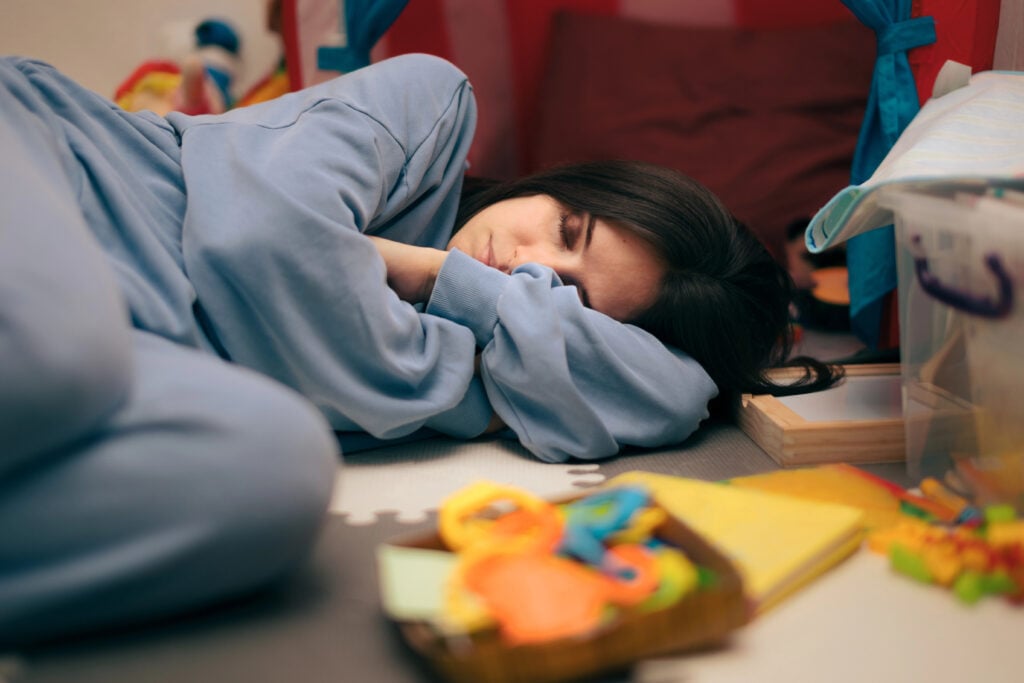
Who were you in high school? Who were you before marriage and kids?
You probably have a list of descriptors you’d use for your teen self: athlete, science award winner, friend. As an adult before kids, maybe you used words to describe your career, hobbies, and abilities. For example, you might have been a crossword-obsessed super barista who played tennis on weekends.
Today, most of us would probably start with “Well, I’m a mom….”
Being A Parent Can Be A Wonderful Identity

We describe ourselves as moms in many ways —boy mom, soccer mom, fun mom, crunchy mom, homeschool mom, full-time mom, and more —but for almost half of parents, giving birth transitions us into a new world in which ‘mom’ becomes our primary identity. (Note: While moms are still statistically more likely to be the primary caregiver and to leave their career to be stay-at-home parents, this can all apply to any parent, regardless of gender.)
Maybe your social media handle is [Kid’s name]’s Mom, or MomOf3. Maybe your Facebook bio lists your kids’ birthdays, and all of your photos are of your kids, and every book you’ve read in the past year was by Dr. Seuss, Roald Dahl, or Maurice Sendak.
All of that is fine, and wonderful, as long as it’s working for you and you’re happy.
The problem is more when you look up one day and realize you can’t remember who you are other than a parent.
What would you read just for yourself? What would you like to watch, if you had the remote and the energy to stay awake through a show after the kids went to bed? Where would you go if you had the time and money to go out alone or with friends?
If Some Of That Sounds Familiar, You’re In Good Company
A recent survey found that around 49% of parents say they suffered some loss of their own identity after having kids.
These parents describe turning down career opportunities, giving up their social lives, and losing time to pursue some of their favorite hobbies. Perhaps even more damaging, almost half say they no longer get enough sleep because they’re too busy with other responsibilities, and nearly a quarter say they’ve entirely given up on anything that could be called self-care, according to Parents.
All of this results in a loss of any sense of self or individuality. And let’s be honest — a year or three of another person using you as their primary source of food, comfort, security, and literally everything else really does blur the lines of where you end and your child begins.
What’s The Result?
Some folks thrive this way — well, perhaps not on lack of sleep and self-care, but in devoting their every waking minute to the needs of another person. Most parents do it to some extent, but the degree and whether it’s affirming, exhausting, or self-destructive depend on many factors, including the individuals involved.
While we may differ on how much we can sacrifice, the bottom line is that for any parent, crossing that line can result in exhaustion, burnout, and even resentment.
In fact, the U.S. Surgeon General released an advisory in 2023 acknowledging the damage parental stress can cause. Their data found that nearly half (48%) of parents say that their day-to-day stress is overwhelming, compared to about a quarter (26%) of non-parent adults.
Their list of stressors that are taking some parents to the breaking point included worries about their kids, financial strain, concerns about the future, and isolation.
Moreover, a 2021 study found that parental burnout has wide-ranging adverse effects, including a strain on the marriage and an increase in the risk of child neglect or abuse.
In other words, if you’re passing the point of mere stress and exhaustion and nearing the line of burnout, then getting a break isn’t just necessary for your own well-being, but to maintain your capability as a parent to your babies.
How Can We Stop Parental Burnout?

The key is to prevent burnout before it starts, if possible.
That means that you absolutely have to take time for yourself and your own needs. You’re the only person who can determine precisely what those are.
For some parents, it might be as simple as setting a rule for yourself not to spend your commute worrying about home. Others might need to allow themselves an hour off every day to do something they love — garden, read, play that video game you abandoned when the baby came.
You may have to work together with your partner to find an arrangment that works, so that each of you gets some needed alone time, or each gets an evening out with friends once a month. Or, you might work out a deal to trade with the parent of your child’s best friend, so that your child spends Tuesday afternoons at her house, and her child visits you after school on Thursdays, so that you each get an afternoon off.
For all of us, it means, at a bare minimum, making sure we meet our own physical needs: healthy food, enough sleep, drinking water, and bathing. After physical needs, we should make an effort to meet our emotional and self-actualization needs.
Parents are still people too, and every parent deserves time for themselves and to feel whole.

